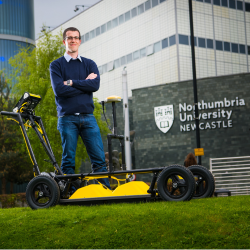-
Study
-
UCAS Clearing 2024
- Clearing Courses
- The Clearing Process
- UCAS Tariff Points
- Clearing 2024 FAQs
- Confirmation
- Clearing Virtual Event
-
Undergraduate
- Search for a Course
- Undergraduate Open Day & Events
- Application Guides
- Northumbria University UCAS Exhibitions
- Foundation Years
- Undergraduate Fees & Funding
- School & College Outreach
- Continuing Professional Development
-
Postgraduate
- Postgraduate Study Degree
- Postgraduate Research Degrees
- Postgraduate Open Days and Events
- Postgraduate Fees & Funding
- Flexible Learning
- Thinking about a Masters?
- Continuing Professional Development
- Change Direction
-
Student Life
- The Hub - Student Blog
- Accommodation
- Life in Newcastle
- Support for Students
- Careers
- Information for Parents
- Students' Union
- Northumbria Sport
-
-
International
International
Northumbria’s global footprint touches every continent across the world, through our global partnerships across 17 institutions in 10 countries, to our 277,000 strong alumni community and 150 recruitment partners – we prepare our students for the challenges of tomorrow. Discover more about how to join Northumbria’s global family or our partnerships.
View our Global Footprint-
Applying to Northumbria
- European Union
- Our London Campus
- Northumbria Pathway
- International Events
- Entry Requirements and Country Representatives
- Regional Offices
-
Northumbria Language Centre
- Faculty Requirements
- Acceptable English Requirements
- Pre-Sessional English and Study Skills
- Academic Language Skills Programmes (ALS)
-
International Fees, Funding & Scholarships
- International Undergraduate Fees
- International Undergraduate Funding
- International Masters Fees
- International Masters Funding
- International Postgraduate Research Fees
- International Postgraduate Research Funding
- International Money Matters
-
Life at Northumbria
- International student support
- Careers
-
International Mobility
- Current Northumbria Students
- Incoming Exchange Students
-
-
Business
Business
The world is changing faster than ever before. The future is there to be won by organisations who find ways to turn today's possibilities into tomorrows competitive edge. In a connected world, collaboration can be the key to success.
More on our Business Services -
Research
Research
Northumbria is a research-rich, business-focused, professional university with a global reputation for academic quality. We conduct ground-breaking research that is responsive to the science & technology, health & well being, economic and social and arts & cultural needs for the communities
Discover more about our Research -
About Us
-
About Northumbria
- Our Strategy
- Our Staff
- Place and Partnerships
- Student Profiles
- Alumni Profiles
- Leadership & Governance
- Academic Departments
- University Services
- History of Northumbria
- Contact us
- Online Shop
-
-
Alumni
Alumni
Northumbria University is renowned for the calibre of its business-ready graduates. Our alumni network has over 237,000 graduates based in 178 countries worldwide in a range of sectors, our alumni are making a real impact on the world.
Our Alumni - Work For Us
What will I learn on this module?
This module will extend and enhance your current understanding of human-computer interaction and UX theory/practice in support of the user experience, by investigating how people experience ubiquitous computing technologies (e.g., smart devices and wearables), both individually and in groups across a variety of contexts and domains.
’Experimental Design of Interactive Applications’ will explore key aspects of interaction design, focusing on how we can effectively understand and improve user interaction in context. Real-world examples (e.g., sourced from industry/employers/research) will be used to illustrate the importance of adopting an iterative, user-centred approach to user journey mapping and interface development which supports equality, diversity, and inclusion.
A range of experimental design methods and UX practices will be covered (e.g., task-based usability tests, usability inspection methods, lab- and field-test planning and deployment), enhancing your knowledge and understanding of relevant theory and techniques whilst helping you to develop practical and transferable skills within the UX domain. Employers are looking for computing students who understand the importance of user experience and interaction design, can work as individuals or members of a team to analyse interaction design problems in context and, can apply effective experimental design and UX techniques in order to devise effective design solutions for the user experience.
How will I learn on this module?
You will learn through lectures, workshops, and independent study. The lectures will cover theories and concepts that will enable you to tackle a series of guided experimental design and UX activities. Using real-world case studies, you will work on these during workshops and hands-on sessions in Northumbria’s CIS building computer labs, which are fully equipped with the latest industry-standard software – you will also have access to additional IT resources to help with your experimental work.
How will I be supported academically on this module?
The module includes a combination of methods to support learning, where typically topics will be introduced in lectures before being explored through theoretical debates, practical exercises focused on skills development, feedback from tutors, and guided learning activities. You will be encouraged to develop independent learning skills to manage experimental design and UX practices. The University’s eLearning Portal offers remote access to all lecture and workshop materials to reinforce your learning. In addition, the university library offers support for all students by providing electronic resources.
What will I be expected to read on this module?
All modules at Northumbria include a range of reading materials that students are expected to engage with. The reading list for this module can be found at: http://readinglists.northumbria.ac.uk
(Reading List service online guide for academic staff this containing contact details for the Reading List team – http://library.northumbria.ac.uk/readinglists)
What will I be expected to achieve?
Knowledge & Understanding:
MLO1 Develop a critical understanding of user experience and interaction challenges for ubiquitous computing technologies.
MLO2 Develop knowledge and understanding of methods and techniques for the specification of experimental design requirements.
Intellectual / Professional skills & abilities:
MLO3 Identify, apply, and reflect on appropriate experimental methods and techniques for investigating user experience and interaction challenges.
MLO4 Critically evaluate experimental methods and techniques used to capture and analyse user experiences in-context.
Personal Values Attributes (Global / Cultural awareness, Ethics, Curiosity) (PVA):
MLO5 Develop, analyse and report on research-informed practices used in the design and deployment of user experience and interaction design experiments in-context.
How will I be assessed?
The main element of summative assessment (100%) will be a final report (2000 words in length) and accompanying analysis (based on a sample set of experimental recordings) that brings together the experimental research plans, findings/analysis and evaluations.
This assessment addresses Module Learning Outcomes; MLO1, MLO2, MLO3, MLO4 & MLO5.
You will receive both informative and confirmatory feedback on your assessments, which can be used to feed-forward into other modules.
Formative assessment will take place through workshop activities which make use of real-world case studies and experimental design/UX activities which mirror the final assessment requirements, addressing Module Learning Outcomes MLO1, MLO2, MLO3, MLO4 & MLO5.
Formative feedback will be given throughout the module on workshop activities you are required to complete.
Pre-requisite(s)
Level 5 - HCI Module
Co-requisite(s)
N/A
Module abstract
This module explores the UX theory, principles, and practice underpinning experimental design and testing aimed at developing a clear understanding of the user and their experience with ubiquitous computing technologies in-context. Indicative topics include: trends in interaction design and ubiquitous technology use; experimental methodologies, techniques and research practices; designing and implementing experimental design research; collation, analysis and presentation of data; and, synthesising data in order to make recommendations for improving the user experience in-context. Theory is followed by practical workshops where you will be introduced to different experimental design methods, tools, and techniques for exploring user behaviour. You will apply the acquired UX theoretical knowledge and practical skills in the planning, designing and execution of experiments assessing interaction behaviours and user experience in-context, thereby ensuring we design technology that meet their needs. The module will help you develop key skills required for future employment as a UX researcher or designer.
Course info
UCAS Code GN50
Credits 20
Level of Study Undergraduate
Mode of Study 3 years Full Time or 4 years with a placement (sandwich)/study abroad
Department Computer and Information Sciences
Location City Campus, Northumbria University
City Newcastle
Start September 2024 or September 2025
All information is accurate at the time of sharing.
Full time Courses are primarily delivered via on-campus face to face learning but could include elements of online learning. Most courses run as planned and as promoted on our website and via our marketing materials, but if there are any substantial changes (as determined by the Competition and Markets Authority) to a course or there is the potential that course may be withdrawn, we will notify all affected applicants as soon as possible with advice and guidance regarding their options. It is also important to be aware that optional modules listed on course pages may be subject to change depending on uptake numbers each year.
Contact time is subject to increase or decrease in line with possible restrictions imposed by the government or the University in the interest of maintaining the health and safety and wellbeing of students, staff, and visitors if this is deemed necessary in future.
Useful Links
Find out about our distinctive approach at
www.northumbria.ac.uk/exp
Admissions Terms and Conditions
northumbria.ac.uk/terms
Fees and Funding
northumbria.ac.uk/fees
Admissions Policy
northumbria.ac.uk/adpolicy
Admissions Complaints Policy
northumbria.ac.uk/complaints














